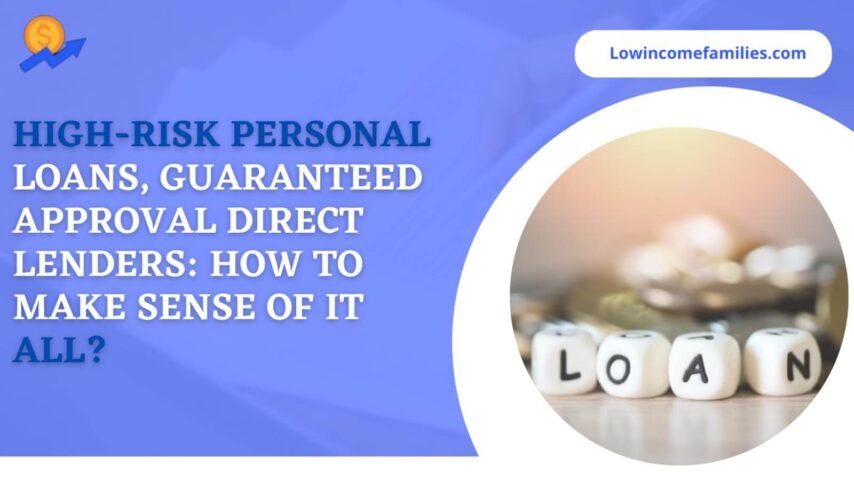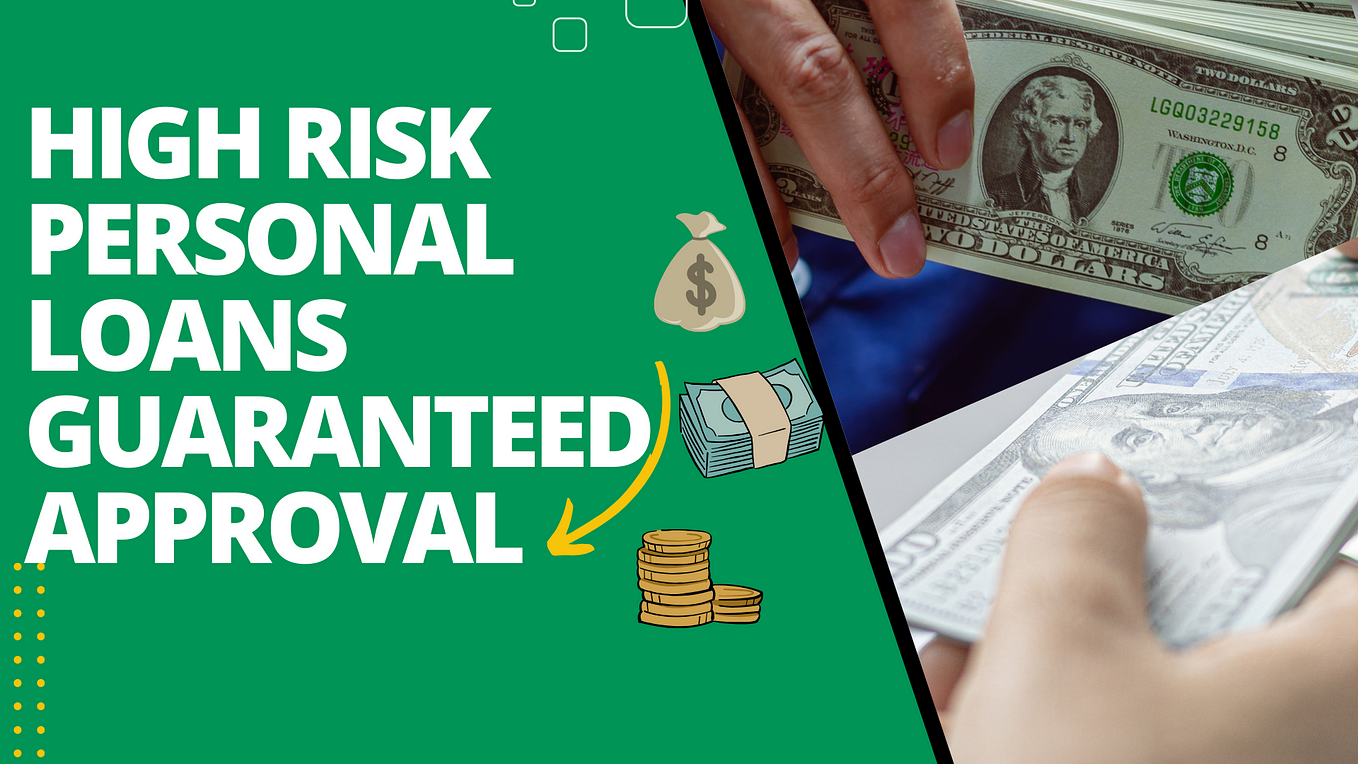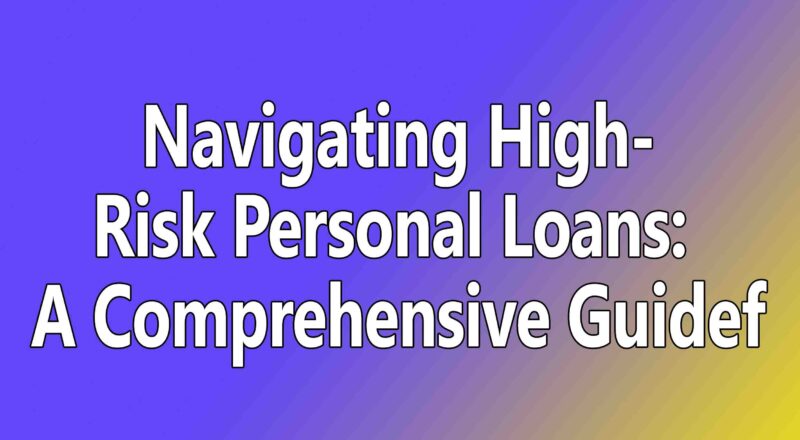High Risk Personal Loans Guaranteed Approval

Imagine Sarah, a single mother working tirelessly to make ends meet. Her old car, her lifeline to work and daycare, sputtered its last breath. Desperate, she searched online, the promise of "High-Risk Personal Loans Guaranteed Approval" flashing like a beacon in the darkness.
These loans, often marketed with aggressive promises, target individuals with poor credit histories. While seemingly offering a lifeline, they often come with exorbitant interest rates and fees, potentially trapping borrowers in a cycle of debt. This article delves into the world of "high-risk personal loans guaranteed approval," examining their appeal, risks, and what consumers should know before taking the plunge.
Understanding High-Risk Personal Loans
High-risk personal loans are designed for individuals with credit scores that fall below the traditional lending threshold. These borrowers are often considered too risky by conventional banks and credit unions. As a result, a niche market of lenders has emerged, willing to offer loans to this demographic.
The catch? These loans come at a steep price. Interest rates can soar into the double or even triple digits, dwarfing those of standard personal loans. Fees, often hidden in the fine print, can further inflate the overall cost of borrowing.
The Allure of "Guaranteed Approval"
The phrase "guaranteed approval" is a powerful marketing tool. It preys on the desperation of individuals who have been turned down by other lenders. However, it's crucial to understand that no legitimate lender can truly guarantee approval without considering a borrower's ability to repay.
According to the Federal Trade Commission (FTC), promises of guaranteed approval are often red flags. They may indicate predatory lending practices or even outright scams. Legitimate lenders will always conduct some form of credit check and assess the borrower's income and debt-to-income ratio.
Risks and Consequences
The high cost of these loans can quickly spiral out of control. Borrowers may find themselves struggling to keep up with payments. Late fees and penalties can compound the problem, making it even more difficult to escape the debt cycle.
Defaulting on a high-risk personal loan can have severe consequences. It can further damage a borrower's credit score, making it even harder to obtain credit in the future. Collection agencies may pursue the debt aggressively, leading to stress and financial hardship.
In some cases, lenders may resort to legal action, such as wage garnishment. This can further destabilize a borrower's financial situation, making it difficult to meet basic needs.
Predatory Lending Practices
Unfortunately, the high-risk loan market is rife with predatory lending practices. Some lenders target vulnerable individuals, such as the elderly, low-income earners, and those with limited financial literacy.
These lenders may use deceptive marketing tactics, such as false advertising and misleading disclosures. They may also charge excessive fees and interest rates, knowing that borrowers have few other options. It's important to be wary of lenders who pressure you to borrow more than you need or who fail to clearly explain the terms of the loan.
The Consumer Financial Protection Bureau (CFPB) has taken action against several lenders for engaging in predatory lending practices. These actions highlight the importance of consumer awareness and protection.
Alternatives to High-Risk Personal Loans
Before resorting to a high-risk personal loan, explore alternative options. These may include secured loans, credit counseling, and borrowing from friends or family.
Secured loans, such as car title loans or pawnshop loans, require borrowers to put up collateral. While these loans may be easier to obtain, they also carry significant risks. If you default on the loan, you could lose your car or other valuable assets.
Credit counseling can provide valuable assistance in managing debt and improving credit scores. Counselors can help you create a budget, negotiate with creditors, and develop a plan to get out of debt.
Borrowing from friends or family can be a more affordable option than taking out a high-risk loan. However, it's important to formalize the agreement in writing to avoid misunderstandings and strained relationships.
Building Credit for Better Options
Improving your credit score can open doors to more affordable borrowing options. Start by reviewing your credit report and disputing any errors. Make all payments on time and avoid maxing out your credit cards.
Consider becoming an authorized user on a friend or family member's credit card. This can help you build credit without taking on additional debt. You can also apply for a secured credit card, which requires a security deposit.
Patience and discipline are key to rebuilding credit. It takes time and effort, but the rewards are well worth it. A good credit score can save you thousands of dollars in interest over the long term.
The Role of Regulation
Government regulation plays a crucial role in protecting consumers from predatory lending practices. The CFPB and other agencies have the authority to investigate and prosecute lenders who violate consumer protection laws.
State laws also play a significant role in regulating high-risk loans. Some states have implemented interest rate caps and other restrictions to protect borrowers. It's important to be aware of the laws in your state before taking out a loan.
Advocacy groups and consumer organizations also work to educate consumers about their rights and to lobby for stronger consumer protections. These groups provide valuable resources and support to borrowers who have been victimized by predatory lenders.
Staying Informed and Protected
The best defense against predatory lending is knowledge. Educate yourself about the risks of high-risk loans and the warning signs of scams. Be wary of lenders who make promises that seem too good to be true.
Always read the fine print carefully before signing any loan agreement. Make sure you understand the interest rate, fees, and repayment terms. If you have any doubts, consult with a financial advisor or attorney.
Report any suspected predatory lending practices to the FTC or your state's attorney general. By working together, we can protect consumers from financial exploitation.
Conclusion: A Path Forward
While "high-risk personal loans guaranteed approval" may seem like a quick fix, they often lead to long-term financial hardship. Exploring alternatives and building credit are crucial steps toward financial stability. It's a journey, not a sprint, requiring informed decisions and a commitment to financial well-being.
For Sarah, the realization that these loans could bury her deeper in debt was a turning point. She sought help from a local credit counseling agency, began repairing her credit, and eventually secured a more affordable loan to replace her car. Her story is a reminder that even in the face of financial challenges, hope and better options exist.


















